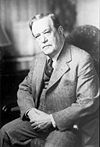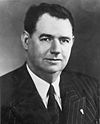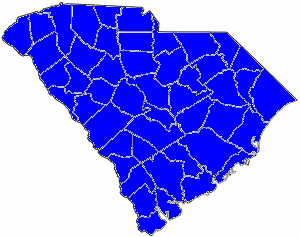
United States Senate election in South Carolina, 1938
Encyclopedia

United States Senate
The United States Senate is the upper house of the bicameral legislature of the United States, and together with the United States House of Representatives comprises the United States Congress. The composition and powers of the Senate are established in Article One of the U.S. Constitution. Each...
from the state of South Carolina
South Carolina
South Carolina is a state in the Deep South of the United States that borders Georgia to the south, North Carolina to the north, and the Atlantic Ocean to the east. Originally part of the Province of Carolina, the Province of South Carolina was one of the 13 colonies that declared independence...
. Incumbent Democratic
Democratic Party (United States)
The Democratic Party is one of two major contemporary political parties in the United States, along with the Republican Party. The party's socially liberal and progressive platform is largely considered center-left in the U.S. political spectrum. The party has the lengthiest record of continuous...
Senator Ellison D. Smith
Ellison D. Smith
Ellison DuRant "Cotton Ed" Smith was a Democratic Party politician from the U.S. state of South Carolina. He represented South Carolina in the United States Senate from 1909 until 1944....
defeated Governor
Governor of South Carolina
The Governor of the State of South Carolina is the head of state for the State of South Carolina. Under the South Carolina Constitution, the Governor is also the head of government, serving as the chief executive of the South Carolina executive branch. The Governor is the ex officio...
Olin D. Johnston
Olin D. Johnston
Olin DeWitt Talmadge Johnston was a Democratic Party politician from the US state of South Carolina. He served as the 98th Governor of South Carolina, 1935–1939 and 1943–1945, and represented the state in the United States Senate from 1945 until his death in 1965.-Early Life, Military Involvement,...
in the Democratic primary. The general election was contested, but a victory by Smith was never in doubt.
Democratic primary
Senator Ellison D. SmithEllison D. Smith
Ellison DuRant "Cotton Ed" Smith was a Democratic Party politician from the U.S. state of South Carolina. He represented South Carolina in the United States Senate from 1909 until 1944....
was marked by President Franklin D. Roosevelt
Franklin D. Roosevelt
Franklin Delano Roosevelt , also known by his initials, FDR, was the 32nd President of the United States and a central figure in world events during the mid-20th century, leading the United States during a time of worldwide economic crisis and world war...
for defeat because he had vociferously opposed many policies of the New Deal
New Deal
The New Deal was a series of economic programs implemented in the United States between 1933 and 1936. They were passed by the U.S. Congress during the first term of President Franklin D. Roosevelt. The programs were Roosevelt's responses to the Great Depression, and focused on what historians call...
. Governor
Governor of South Carolina
The Governor of the State of South Carolina is the head of state for the State of South Carolina. Under the South Carolina Constitution, the Governor is also the head of government, serving as the chief executive of the South Carolina executive branch. The Governor is the ex officio...
Olin D. Johnston
Olin D. Johnston
Olin DeWitt Talmadge Johnston was a Democratic Party politician from the US state of South Carolina. He served as the 98th Governor of South Carolina, 1935–1939 and 1943–1945, and represented the state in the United States Senate from 1945 until his death in 1965.-Early Life, Military Involvement,...
announced at the Whitehouse that he was going to challenge Smith in the Democratic primary and would be fully supportive of every Roosevelt policy. State Senator
South Carolina Senate
The South Carolina Senate is the upper house of the South Carolina General Assembly, the lower house being the South Carolina House of Representatives...
Edgar Allan Brown
Edgar Allan Brown
Edgar Allan Brown was a long time Democratic legislator of South Carolina from Barnwell County who served South Carolina from 1922-1972. He was a principal member of the so-called "Barnwell Ring".-Early life and career:...
also threw his hat into the ring pledging that he would back Roosevelt and would be the most effective candidate in bringing home the bacon.

Congress of Industrial Organizations
The Congress of Industrial Organizations, or CIO, proposed by John L. Lewis in 1932, was a federation of unions that organized workers in industrial unions in the United States and Canada from 1935 to 1955. The Taft-Hartley Act of 1947 required union leaders to swear that they were not...
(CIO), but these two organizations were frowned upon in South Carolina. They advanced racial integration, advocated labor militancy and were believed to have been controlled by Communists. Smith hammered Johnston for having these ties claiming that Johnston "endorsed the nigger, and went one hundred percent for anything belonging to the New Deal, right or wrong, because he does not have guts to disagree." Smith then boasted of his endorsement by the racially exclusive American Federation of Labor
American Federation of Labor
The American Federation of Labor was one of the first federations of labor unions in the United States. It was founded in 1886 by an alliance of craft unions disaffected from the Knights of Labor, a national labor association. Samuel Gompers was elected president of the Federation at its...
(AFL) and stress that a vote for Johnston would embolster the CIO to force the employment of blacks in factories alongside whites.
On August 11, Roosevelt's train stopped in Greenville
Greenville, South Carolina
-Law and government:The city of Greenville adopted the Council-Manager form of municipal government in 1976.-History:The area was part of the Cherokee Nation's protected grounds after the Treaty of 1763, which ended the French and Indian War. No White man was allowed to enter, though some families...
to a crowd of 15,000 with the three candidates aboard. He had spoken the previous day in Georgia against the re-election of Senator Walter F. George
Walter F. George
Walter Franklin George was an American politician from the state of Georgia. He was a long-time United States Senator and was President pro tempore. He was a Democrat.-Early years:...
and was expected to make an endorsement of Olin Johnston at Greenville. Roosevelt criticized Smith for his 1937 speech in the Senate that South Carolinians were willing to work for fifty cents a day. Yet before Roosevelt could finish his address, the train started to leave. Smith trumpeted up the fact that Roosevelt never explicitly endorsed Johnston and responded to Roosevelt's charge that his Senate speech was taken out of context. Johnston claimed that it was insinuated by Roosevelt whom he supported and he made it clear that he boarded the President's train in Georgia, whereas the other two candidates boarded just outside of Greenville. Brown felt slighted by the President's brief remarks and withdrew from the race on August 27.
Smith was supported by two powerful figures in South Carolina politics: Senator James F. Byrnes
James F. Byrnes
James Francis Byrnes was an American statesman from the state of South Carolina. During his career, Byrnes served as a member of the House of Representatives , as a Senator , as Justice of the Supreme Court , as Secretary of State , and as the 104th Governor of South Carolina...
and Charleston mayor Burnet Maybank. Unlike Smith, Byrnes was a well known pro-Roosevelt New Dealer. However, Byrnes opposed Roosevelt's 1938 "southern purge" against Smith and two other anti-New Deal Democrat senators Walter F. George
Walter F. George
Walter Franklin George was an American politician from the state of Georgia. He was a long-time United States Senator and was President pro tempore. He was a Democrat.-Early years:...
of Georgia and Millard Tydings
Millard Tydings
Millard Evelyn Tydings was an attorney, author, soldier, state legislator, and served as a Democratic Representative and Senator in the United States Congress from Maryland.-Early life:...
of Maryland. Byrnes envisioned that Smith would retire in 1944 and his friend Maybank, having served a term as governor, would take the seat. He felt that he could work much better with Maybank and that the two of them could build a political machine to control the state.
The primary election
Primary election
A primary election is an election in which party members or voters select candidates for a subsequent election. Primary elections are one means by which a political party nominates candidates for the next general election....
was held on August 30 and Smith won a commanding victory over Johnston. In order to win, Johnston needed to rack up huge margins in the Upstate
The Upstate
The Upstate is the region in northwestern South Carolina, United States, also known as The Upcountry, which is the historical term. Although loosely defined among locals, the general definition includes the 10 counties of the commerce-rich I-85 corridor in the northwest corner of South Carolina. ...
, but the two candidates broke even. Smith overwhelmingly won in the rural areas because Johnston's constant emphasis of his labor roots made the agriculture voters feel that he did not care about their interests. It was also believed that at this point in time, however, that the people of South Carolina had become fed up with Smith and that he would've lost the primary if not for Roosevelt's interference.
| Democratic Primary | ||
|---|---|---|
| Candidate | Votes | % |
General election campaign
Despite a RepublicanRepublican Party (United States)
The Republican Party is one of the two major contemporary political parties in the United States, along with the Democratic Party. Founded by anti-slavery expansion activists in 1854, it is often called the GOP . The party's platform generally reflects American conservatism in the U.S...
candidate being nominated for the general election contest, there was never any possibility that Smith would be defeated. The Republican Party was nothing more than a patronage institution and at the time was widely despised by the South Carolinians for bringing destruction to the state during Reconstruction.
General election results
| colspan=5 |DemocraticDemocratic Party (United States)
The Democratic Party is one of two major contemporary political parties in the United States, along with the Republican Party. The party's socially liberal and progressive platform is largely considered center-left in the U.S. political spectrum. The party has the lengthiest record of continuous...
hold
|-

See also
- List of United States Senators from South Carolina
- United States Senate elections, 1938
- United States House of Representatives elections in South Carolina, 1938United States House of Representatives elections in South Carolina, 1938The 1938 South Carolina United States House of Representatives elections were held on November 8, 1938 to select six Representatives for two-year terms from the state of South Carolina. The primary elections were held on August 30 and the runoff elections were held two weeks later on September 13...
- South Carolina gubernatorial election, 1938South Carolina gubernatorial election, 1938The 1938 South Carolina gubernatorial election was held on November 8, 1938 to select the governor of the state of South Carolina. Burnet Rhett Maybank, mayor of Charleston, won the contested Democratic primary and defeated Republican Joseph Augustis Tolbert in the general election becoming the...

